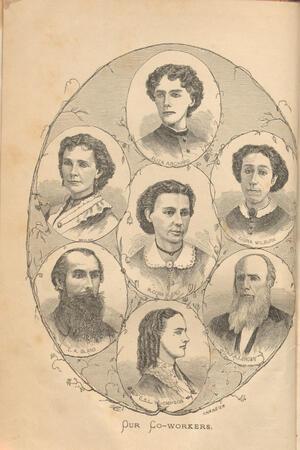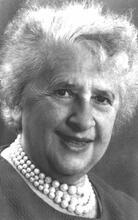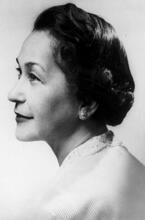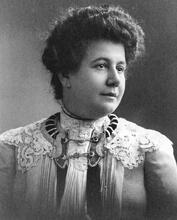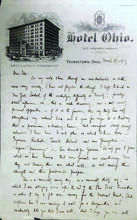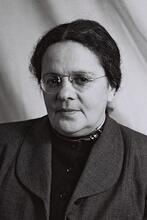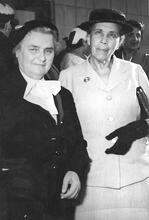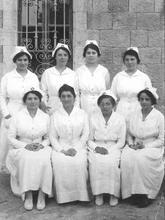Cora Wilburn
Cora Wilburn was one of the most prolific American Jewish women writers of her time. After the death of her father, an unscrupulous merchant and con man and abusive husband and father who dragged his family around the world to escape creditors and victims, she immigrated to the United States. After several difficult years of mind-numbing toil, Wilburn became a professional writer and aligned herself with the fast-growing but controversial Spiritualist movement. She published regularly in Spiritualist magazines, producing serialized novels (including Cosella Wayne, the first coming-of-age novel to depict Jews in the United States), lengthy translations from German and French, colorful short stories, pointed non-fiction essays, and hundreds of poems. Her writings show her to have been a staunch advocate of social justice. In middle age, she began to affiliate with Reform Judaism and began writing mostly poetry, including a poem written for the Jewish Women’s Congress in Chicago.
Cora Wilburn, novelist, essayist, and poet, was one of the most prolific American Jewish women writers of her time. Much of her work appeared in secular and Spiritualist publications, such as The Banner of Light, but during her final decades she published poetry in Jewish publications, particularly the Philadelphia Jewish Record and B’nai Brith’s Menorah. Her autobiographical novel, Cosella Wayne, published serially in 1860, was the first coming-of-age novel to depict Jews in the United States.
Family
Wilburn was born on December 1, 1824, most likely in Alsace. Her original first name, according to her diary, was Henrietta. She entered the United States in 1848 under the family name “Jackson,” but records reveal that her father’s original name was “Moritz Pulfermacher.” She published under the name “Cora Wilburn,” which subsequently became her legal name. While her writing displays fluency in German and significant knowledge of French and Spanish as well as rudimentary Yiddish, she wrote and published in English.
Cora Wilburn’s father, whom she despised and whose family name she subsequently discarded, was an unscrupulous itinerant gem merchant and con man, as well as an abusive father and husband. He remarried following the untimely death of Cora’s mother but maintained his criminal ways. Wilburn’s writings reveal that her father dragged his second wife and adolescent daughter “nearly over the world” to escape creditors and victims. Later, she employed what she learned through her travels to describe in her writings such exotic locations as Singapore, Burma, India, Australia, Hawaii, and Venezuela.
Wilburn’s surviving diary, one of the earliest known American Jewish women’s diaries, commenced upon her arrival in La Guaira, Venezuela, on February 28, 1844. It paints a grim picture of her family, depicting her father as abusive toward his wife and daughter and herself as beaten and molested. Cosella Wayne, clearly based upon the diary, expands upon her father’s misdeeds. The death (murder?) of her father in 1845 plunged the orphaned Wilburn into poverty.
Conversion and Immigration to the United States
Adrift in the world, and taken in by sympathetic Catholic neighbors in La Guaira, Wilburn succumbed to pressure from those around her and, on June 24, 1846, converted to Catholicism. “I had repented before it began,” she subsequently admitted to her diary, “but it was now too late, my word had been given.” She attributed manifold misfortunes to this act of apostasy, describing it as “an event that has called upon me the just anger of a most just God.” She vowed, eighteen months later, to return, “although alone, friendless and penniless, to my religion, to my God!”
Wilburn spent most of her remaining funds and set sail for a final time, hoping to make a fresh start as a Jew in Philadelphia, about which she had read. She spent three weeks at sea on the Euphemia, arrived in New York on September 30, 1848, and reached Philadelphia that same night. Over the ensuing days, she bitterly recalled, her faith in a Jewish moral economy based on mutual assistance was cruelly shattered. She found herself reduced to menial servitude.
Wilburn subsequently depicted this harrowing period of her life in essays and fiction. Her writings uniquely capture the plight of young, impoverished Central European Jewish immigrant women in pre-Civil War Philadelphia. Addressing readers who likely employed seamstresses and servants of their own, she sought sympathy by describing the condition of these unfortunate young women—including those who succumbed to prostitution—based upon what she herself had experienced and seen.
Attraction to Spiritualism
After four years of mind-numbing toil, Wilburn, aided by Christian friends, broke free. She became a professional writer and began life anew in one of the few “respectable” occupations open to a middle-class woman. For the next seventeen years (1852-1869), she aligned herself with the fast-growing but controversial Spiritualist movement, which held that the spirits of the departed lived on in a distinct “spirit world” from which they continued to communicate with human beings. Nourished by the same upstate New York soil as the women’s rights movement, Spiritualists advocated women’s rights and treated women on a par with men in their practices, policies, and ideologies. Wilburn published regularly in Spiritualist magazines such as Banner of Light and The Agitator. Much like Jews who would later participate in such movements as Unitarianism, Ethical Culture, Christian Science, and Buddhism, she insisted that her liberal Spiritualist faith was compatible with being a Jew and required her only “to be true and pure” and “to live the life that is approved of God and angels.” As a religious seeker, she placed her faith in “Nature’s God,” proclaiming that “we need no Bible and no Creed” (“My Religion,” 98).] She settled into an austere life—a mélange of the religion-inspired health reforms so prominent in her day—espousing “temperance in food as well as in drink; in sleep as well as in labor . . . in all our intercourse with the world” [Banner of Light 14 (December 26, 1863), 2].
Prolific Writer and Advocate of Social Justice
Wilburn’s productivity during these years was astonishing. Serialized novels, lengthy translations from German and French, colorful short stories, pointed non-fiction essays, and hundreds of poems as well as a book of poetry entitled The Spiritual Significance of Gems (1868) flowed from her inexhaustible pen. No nineteenth-century American Jewish woman published more. These writings reveal Wilburn to have been a staunch advocate for social justice—a forgotten foremother of twentieth-century liberal Jewish activism. She spoke out boldly against African-American slavery before and during the Civil War. In addition, as early as 1860, other forms of social injustice (“all forms of slavery”) likewise drew from her sharp rebuke, including “the hard-heartedness of landlords, the tasking of the wretched seamstress, the burdening of orphans and widows with the double weight of humiliation and toil, the contemptuous treatment of dependents, [and] the starvation wages that force young women into the paths of degradation” (“My Religion,” 82).
Wilburn’s “outspoken speech and writings” outraged some Spiritualists, notwithstanding the movement’s general engagement with activist causes. Critics did not share her politics, much less her high-minded views on the evils of worldliness and the importance of altruism. Much of the literature on Spiritualism later effaced her name completely. Wilburn, meanwhile, drifted into the new Free Religious Association that aimed to emancipate religion from dogmatic traditions and to “promote the interests of pure religion.” There she became aware of a form of Judaism that embraced the liberal and progressive causes that she held dear. As a result, in 1869, she announced to readers of the Spiritualist Banner of Light that she was returning to the Jewish religion. She explained that she now identified with its “progressive ranks,” not its “so-called Orthodox standard” [Banner of Light, November 13, 1869, 3].
Return to Judaism
Wilburn was almost 45 years old when she made this announcement. Middle age was catching up with her, and her health and productivity had greatly declined. Finding herself with few friends and, significantly, “without one kindred tie in this world,” she looked to live her remaining days in a small cottage in Maine. New York’s Temple Emanu-El, the leading Reform Jewish congregation in the United States, provided her with half the sum needed to purchase the cottage, and generous supporters from the Free Religious Association proffered additional assistance. Maine became her home for several years.
By 1877, though, she was living in the Boston area, and writing mostly for Jewish publications. She no longer produced much in the way of fiction or critical essays; instead, the bulk of her writing consisted of poetry. Visitors found her increasingly bitter and reclusive. Her age, her sex, her ill-health, her poverty—all precluded her from doing more to advance the great social causes that she cherished. Instead, she spent her time caring for beloved animals (a lifelong passion), reading widely, and writing poetry suffused with Jewish themes. Her most celebrated Jewish poem was “Israel to the World in Greeting,” written for the Jewish Women’s Congress in Chicago in 1893, forerunner of the National Council of Jewish Women. The fact that this poem was commissioned and that it subsequently appeared in the pages of the Congress’s published proceedings suggests that contemporaries admired it and looked up to Wilburn as a Jewish poet laureate.
Wilburn in her old age believed that she was witnessing “the dawn of the Woman’s Era.” She encouraged young women of promise, like Henrietta Szold, and gloried in the fact that “the women of Israel are coming to the fore in rostrum, pulpit and other places of public usefulness.” Though she received support from the Jewish community, hers was a reclusive and bitter retirement characterized by poverty and loneliness. Nevertheless, she insisted in a letter that that she remained true to her faith: “I observe the Shabbes [Sabbath] conscientiously; the Pessach [A seven-day festival to commemorate the Exodus from Egypt (eight days outside Israel) beginning on the 15th day of the Hebrew month of Nissan. Also called the "Festival of Mazzot"; the "Festival of Spring"; Pesah.Passover] and the holy days. I keep The Day of Atonement, which falls on the 10th day of the Hebrew month of Tishrei and is devoted to prayer and fasting.Yom Kippur as would the most rigidly orthodox.”
Cora Wilburn died at home in Duxbury, Massachusetts, on December 4, 1906, at the age of 82. Notices of her death appeared in newspapers across the United States, from Boston to Honolulu. In deference to her express wishes, she was cremated; reputedly she was “the first person of Jewish faith” ever cremated in Boston. Since she never married, left no relatives, held controversial views, and mostly wrote for forgotten periodicals, her novels, essays, and poems remain uncollected and largely unread.
Selected Works by Cora Wilburn
“Agnes, The Step-Mother.” Banner of Light, August 6, 1857-November 14, 1857. Reprinted as “Lost and Found.” The Ladies’ Own Magazine 2 (1870).
Cosella Wayne, edited and introduced by Jonathan D. Sarna. Detroit: Wayne State University Press, 2019.
“Dream-Life.” Banner of Light, September 23, 1865 – December 23, 1865.
“Israel to the World in Greeting.” Papers of the Jewish Women’s Congress. Philadelphia: Jewish Publication Society, 1894, 129-132.
“Jasmine, or the Discipline of Life.” Banner of Light 14, September 26, 1863 – December 26, 1863.
“My Religion.” The Agitator 3, December 15, 1859 – April 1, 1860.
“The Slave Mother’s Lament.” The Liberator, November 2, 1860.
The Spiritual Significance of Gems. N.p.: 1868.
Braude, Ann. Radical Spirits: Spiritualism and Women’s Rights in Nineteenth-Century America 2nd ed. Bloomington: Indiana University Press, 2001.
“Cora Wilburn Diary, 1844,” SC-12996, American Jewish Archives.
Eichler, M.M.. “Cora Wilburn.” Jewish Advocate, February 23, 1912, 6.
Sarna, Jonathan D. “Editor’s Introduction.” Cosella Wayne, by Cora Wilburn. Detroit: Wayne State University Press, 2019, xi-xl.
Sarna, Jonathan D. “Jewish Women Without Money: The Case of Cora Wilburn.” Nashim 32 (2018): 23-37.

